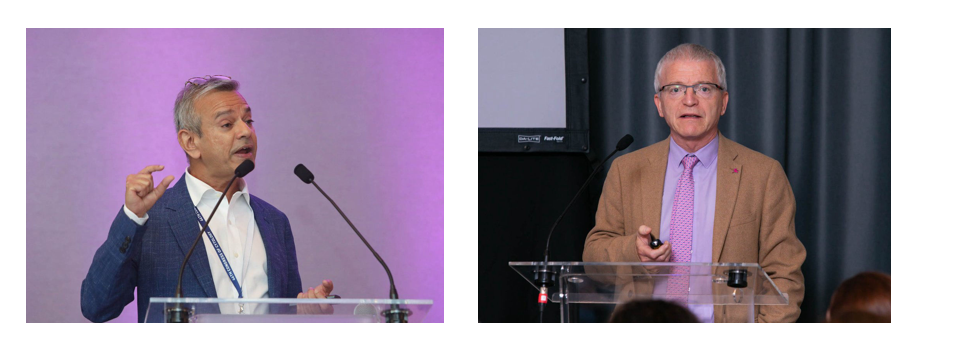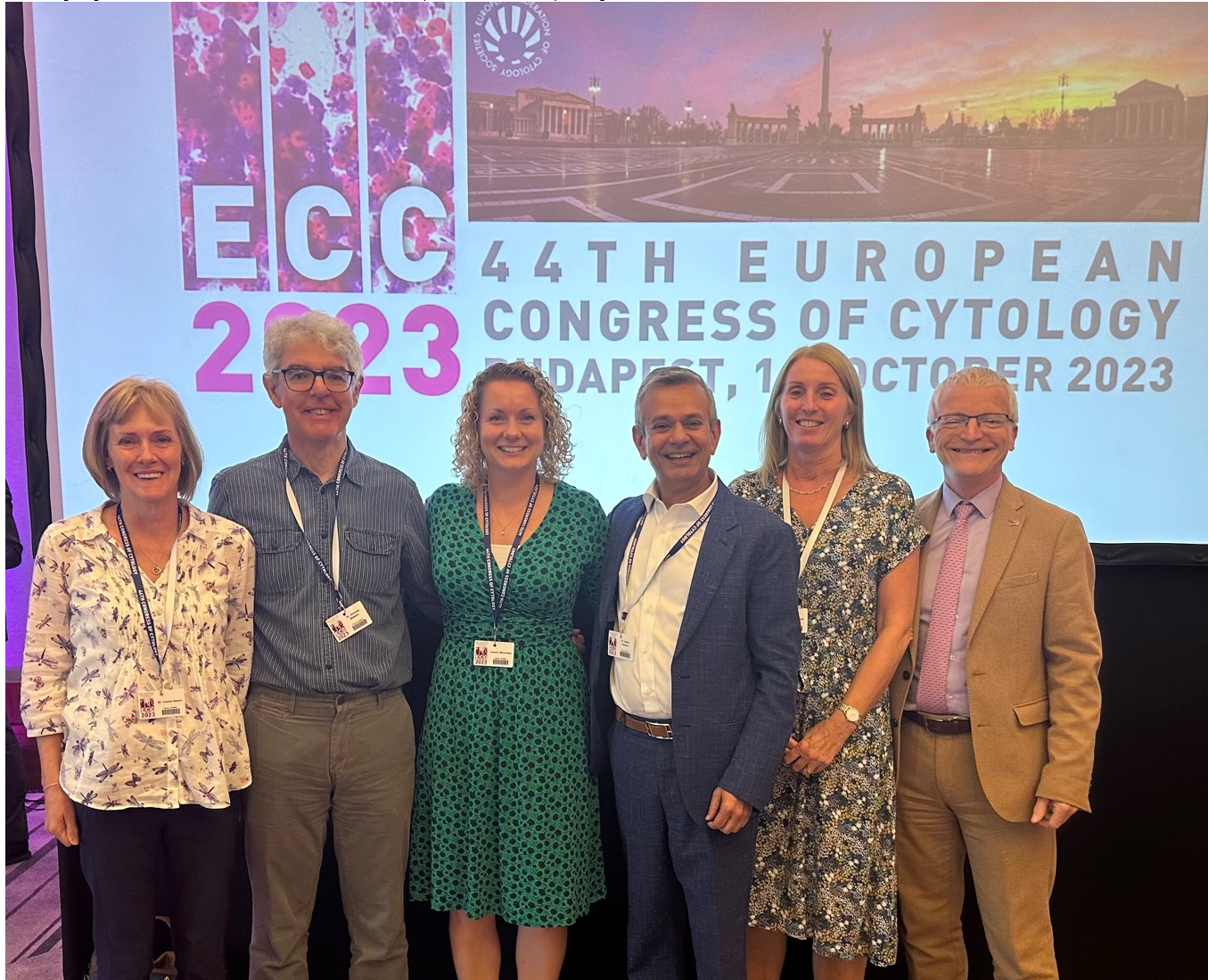The BAC at the European Congress of Cytology (ECC) - BAC companion meeting

The BAC at the European Congress of Cytology (ECC) - BAC companion meeting
With its stunning castle area, impressive Parliament building, flowing Danube and bustling streets lined with alfresco dining, Budapest, the city of two halves, was the perfect backdrop for the 44th ECC (1st-4th October). As usual, the Congress took the form of multiple parallel sessions featuring current topics in diagnostic and gynaecological cytology, and including short companion meetings hosted by some of societies that are members of the European Federation of Cytological Societies (EFCS). The BAC’s companion meeting, held on the morning of Monday 2nd was the perfect opportunity to highlight our Association’s recent activities.
President, Mrs Alison Cropper welcomed an international audience, and introduced the BAC, highlighting that it had the interests and representation of the cytology community in the UK at the heart of its activities.

THE INVASIVE CERVICAL CANCER AUDIT AND DISCLOSURE PROCESS (England)1
Alison Cropper gave the first presentation, a thought-provoking talk on NHS England’s invasive cervical cancer audit and disclosure process. She explained that the purpose of this nationwide compulsory audit is to identify good practice and areas for improvement, and to support learning and development, as well as ensuring people are given information about their screening history review. National guidance issued in 2021 provides a written protocol for standardised conducting of the audit, including definitions for classifying the findings on review – satisfactory, satisfactory with learning points (SLP) and unsatisfactory. The guidance also notes that audit results ‘can form the basis of information for disclosure but is not a legal case review’.
However, for Mrs Cropper and colleagues on the ground involved in the audit, the reality is proving quite different. Not only is the audit process and application of the classification inconsistent across the country but audit results are being used as the basis for litigation with the number of litigation cases on the rise. To address some of the issues, particularly around classifying cases, she explained that the BAC had organised a workshop in June 2023 which included input from clinical and legal representatives. The workshop highlighted that opinions differed on cases reviewed and that SLP cases are often disclosed to patients as being a missed abnormality. She suggested that the audit process needs to be reviewed including the legal consequences.
Mrs Cropper ended her talk by challenging the audience to give their opinion on cell groups from three cases subject to invasive cancer audit.
Audience members from overseas countries where such audit mechanisms are not yet established were fascinated by the detailed process as well as concerned at the potential for misunderstanding inherent in audit and duty of candour.
The BAC Invasive Cancer Audit Workshop will be repeated on 29th November 2023 Invasive Cervical Cancer Audit Seminar All day Lectures and Workshop
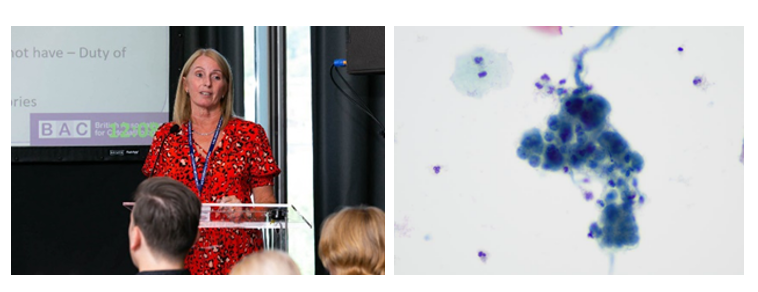
FNA ROSE CASE PRESENTATIONS2
In the last few years, the BAC has keenly supported the development of rapid onsite evaluation (ROSE), including promoting the potential for biomedical scientists (BMSs) to participate in ROSE, evaluating samples for adequacy and triaging sample material. Having given an inspirational talk the previous evening on her own personal journey to become a consultant BMS reporting cytology, Leonie Wheeldon, Consultant BMS, Truro, illustrated the contribution of ROSE through two fascinating case studies. She outlined the single slide assessment method for ROSE microscopy used at her institution - this allows both preserving the bulk of the sample and appropriate further processing of the material. She also presented an algorithm for deciding whether more passes are required although, as her cases illustrate, she stressed the importance of knowing how to proceed in unusual situations and of staying calm! Case1 involved a patient with B cell follicular lymphoma who underwent a series of endoscopic ultrasound (EUS) ROSE procedures and which revealed a surprising diagnosis. Case 2 described the differential diagnosis at EUS ROSE of a peri-gastric node in a patient with lung cancer and a past history of breast cancer and lymphoma. You can read through the fascinating cases (link below) which include Leonie’s valuable tips: when ROSE shows lymphoma, recommend a 19G needle for further passes to obtain “cores” for rinsing into formalin; even if the ROSE slide is acellular, process the rest of the material as there may well be cells; ROSE may not be necessary if re-sampling a previously diagnosed lesion; and of course, it is essential to know the patient’s history prior to ROSE.
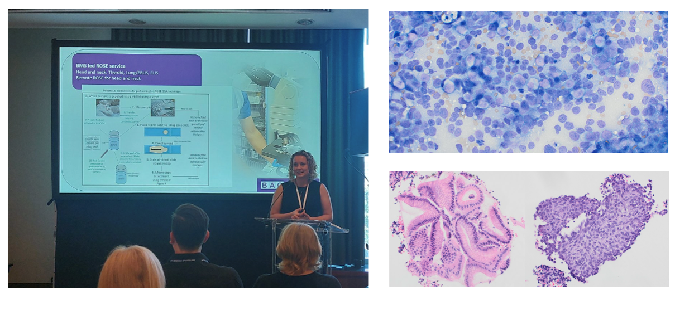
ROSE TRAINING IN THE UK3
Following the case studies showing ROSE in action, BAC chairman and president-elect, Dr Anthony Maddox, updated the audience on the work of the BAC since the 2019 ECC in progressing ROSE training within the UK. Support for ROSE had been growing with the RCPath tissue pathways (2019) recommending BMS ROSE at head and neck FNA clinics, followed in 2020 by a recommendation for ROSE by the British Association of Head and Neck Oncologists. In the USA, the favoured model for ROSE is to have cytotechnologists attending. To facilitate this, the BAC executive drafted a BMS competency framework for ROSE for EBUS, EUS and Head and Neck FNA, updated in 2020, and circulated to the IBMS/RCPath conjoint board. Finally, this year, the IBMS launched a ROSE module available to candidates who have completed a Specialist Diploma qualification and are currently working in a ROSE clinic.
In parallel, discussions between Dr Maddox and the Royal College of Radiologists (RCR) resulted in a survey which highlighted a general lack of knowledge and awareness of ROSE amongst radiologists. This gave impetus for a series of three very well received RCR webinars presented by the BAC’s Dr Maddox and Mrs Wheeldon explaining ROSE and its benefits in optimising FNA samples.
Dr Maddox concluded his talk by highlighting that, with a training module available to BMSs, the challenge will be how and where to provide training. Implementing ROSE will also require buy-in from our clinical colleagues.
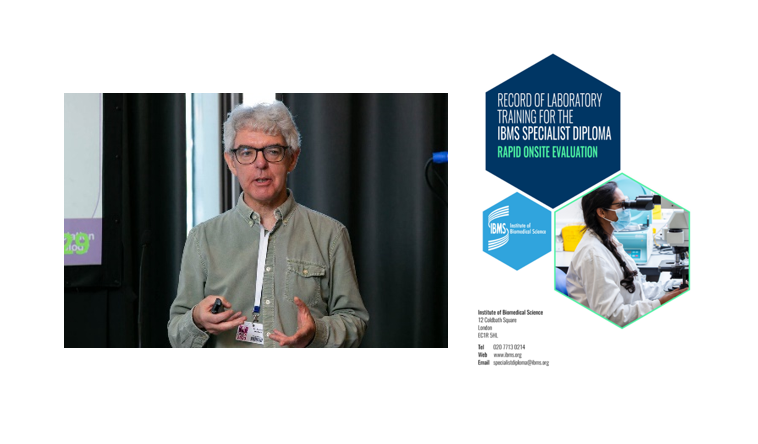
UPDATE ON CYTOPATHOLOGY, THE JOURNAL OF THE BAC4
Cytopathology is the official journal of the BAC and the companion meeting was delighted to welcome editor-in-chief Professor Philippe Vielh to give an update on the journal’s activity. He presented interesting metrics incuding a worldwide distribution of reviewers, impact factor 1.3, citescore 2.6 an acceptance rate below 50%. Turnaround times remain challenging with a median of 78 days from initial submission to final acceptance. Prof Viehl gave examples of the different article types represented in the journal. Dr Louise Smart also gave a short presentation, on the BAC’s SCAN section since SCAN moved from being a biannual online magazine to a section within Cytopathology. Following an introductory editorial in September 2022, there have been five original articles in total covering diverse topics - cytocentrifugation techniques, optimal minimum cervical screening numbers, the BAC code of practice, biomarker testing on cell blocks and a urinary cytology case study. Having a steady stream of high quality articles remains a challenge and submissions are welcome!
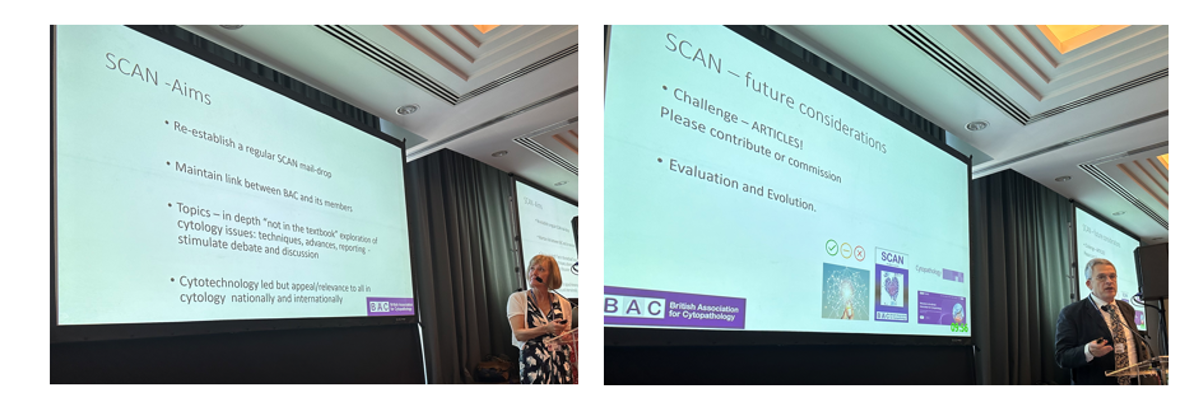
Alison Cropper closed the meeting by thanking the audience and reminding them of the benefits of joining the BAC including access to Cytopathology.
Aside from our companion meeting, BAC members contributed to several sessions in the wider Congress. Dr Ashish Chandra expertly and engagingly chaired two highly informative sessions, one covering the newly released and planned WHO/IARC cytology reporting systems and another on serous fluids. In the session on research publishing, he explained how to select the best journal for your paper, stunning the audience by revealing that his talk had been generated entirely using ChatGPT! It was a fascinating insight into both the benefits and perils of artificial intelligence in the field of scientific publishing. Dr David Poller, in his thyroid session presentation, discussed the UK’s Thy system and the Italian system for reporting thyroid cytology as alternatives to the more widely used Bethesda system (3rd edition, 2023). Reassuringly, he concluded that the classification systems were, overall, very similar. Dr Maria Buttice, who has previously presented at the BAC Spring tutorial 2023, presented remotely in the pancreaticobiliary slide seminar. And finally, past president, Professor Allan Wilson was one of three speakers at a packed-out Hologic Symposium demonstrating the effectiveness and efficiency of digítal cytology in cervical cancer screening, an exciting prospect for those involved in cervical cytology in Europe and beyond.
Overall, the BAC was delighted to play an active role in this year’s ECC and we look forward to participating in the 45th ECC - “Cytopathology: The Clinical Interface” taking place in Leipzig, in June 2024
